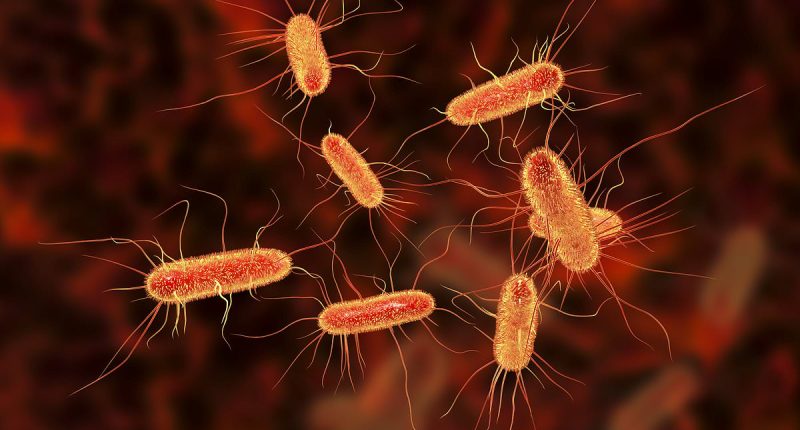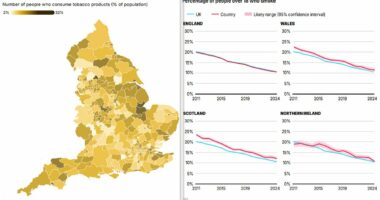Share this @internewscast.com
Experts have sounded the alarm over a surge in the number of people falling ill after eating unwashed salad that’s contaminated with deadly bacteria.
An alarming 17 per cent of people in the UK have admitted that they don’t bother washing their salad, significantly increasing the risk of being infected by potentially deadly bugs such as listeria, according to a new study.
Listeria—which can kill—usually causes a fever, sickness and diarrhoea. But, in more serious cases, it can lead to deadly conditions such as meningitis or sepsis.
More than 280 people meanwhile were struck down by a virulent form of food poisoning that was linked to contaminated lettuce grown in the UK last summer.
An investigation by food safety experts linked the outbreak of Shiga toxin-producing E.coli (STEC)—a rare strain of the diarrhoea-causing bug E.coli—to multiple types of ready meal sandwiches containing the leaves.
In a fresh report analysing UK residents’ salad washing habits, experts warned that better awareness of bacteria lurking in salad—even products that are labelled washed and ready to eat—is essential to keep food poisoning at bay.
Dr Deborah Lee, a UK-based GP turned medical writer, said: ‘Salad leaves are a common source of pathogens, including norovirus, Hepatitis. A, cryptosporidium, giardia, toxoplasma, salmonella, E.coli, campylobacter, yersinia and listeria.
‘They can become contaminated at every step of the production process, from contact with soil, water, handling, equipment or storage. The NHS recommends rewashing all prewashed salads and vegetables before use. This is a vital step in food preparation to help reduce gastroenteritis (food poisoning).’

Whilst 60 per cent of Brits are aware that unwashed salad carries a risk of food poisoning, 17 per cent say they don’t bother washing their leaves, either because they don’t think it’s necessary, they forget, are strapped for time, or think it’s messy

Symptoms of Shiga toxin-producing E.coli include severe diarrhoea and vomiting, according to the UK Health Security Agency
The study analysed the salad washing habits of 2,000 UK residents and found that, whilst 60 per cent of people were aware that unwashed leaves could cause food poisoning, 64 per cent of those who admitted to not washing their produce said that didn’t think it was necessary.
Almost eight per cent of participants said they only use pre-washed, bagged salad.
However, Dr Lee warned that just because a salad bag says ‘washed and ready to eat’, it does not mean that it is free from bacteria.
‘Prewashed salad is washed with chlorine as a disinfectant, then rinsed with pure water,’ she explained. ‘Although this kills over 90 per cent of bacteria, many remain.’
Importantly, food that is contaminated with bacteria such as listeria may not look or smell spoiled but can still cause serious and sometimes life-threatening infections.
For most people, listeria poisoning is similar to the flu, causing a high temperature, muscles aches or pains, chills and nausea or vomiting.
Usually symptoms will improve after a few days.
Health experts recommend re-washing salad at home, to better protect against potentially life-threatening infections.

According to the GP, even washed and ready to eat salad is not guaranteed to be free from bacteria

Those who eat food containing listeria develop an infection called listeriosis, which can cause a fever, aches and pains, chills, nausea, sickness and diarrhoea
‘Rewashing at home provides an additional opportunity to remove any pathogens,’ Dr Lee advised.
‘For best results, after washing or rewashing, always dry lettuce leaves before eating. I would advise always drying salad leaves in a salad spinner – spinning the lettuce creates a centrifugal force that pulls the water and any pathogens away from the leaves,’ she added.
This is because leaving produce damp can encourage the growth of deadly bacteria and mould.
The study also found that more than 70 per cent of people thought that rinsing produce under the tap would suffice, with only 10 per cent using food-safe cleaning solutions such as vinegar.
Heidi Thomas, Head of Marketing for brands such as Zyliss who commissioned the study, said: ‘Consumers are increasingly aware of the need to eat healthily, but it’s just as important to eat safely.
‘The potential risks of not washing salad are very serious – so we must all take time to prep our greens appropriately, even if it slows the cooking process down momentarily,’ the food expert added.
Official also raised the alarm last month over a surge in cases of STEC seen since the pandemic.
In 2024 alone, more than 60 salads, sandwiches and wraps sold across 11 major shops in the UK were slapped with ‘do not eat’ alerts, over fears they could contain STEC.

In December, a 17-year-old girl from Buckinghamshire was left fighting for her life after contracting the deadly E. Coli strain. Antonia Hay is believed to have caught STEC-HUS, caused by E. coli O157, from food at a Christmas market in Great Missenden

Officials have not yet traced the source of the outbreak of Shiga toxin-producing E.coli (STEC), a rare strain of the diarrhoea-causing bug. But they believe it is linked to a ‘nationally distributed food item’ or ‘multiple food items’
The outbreak sickened 288 patients, causing nine cases of haemolytic uremic syndrome (HUS) — a life-threatening condition that can lead to kidney failure — and two deaths, the UKHSA reported.
Experts believe the fact that salad items, such as lettuce, are not usually cooked could be behind the surge in cases, as heating can kill off bugs, decreasing the risk of food poisoning.
Symptoms of infection vary from stomach cramps and vomiting to bloody diarrhoea, UKHSA says, with around half of people infected experiencing the latter.
However, it is often difficult to spot because the same symptoms can be caused by a variety of bugs, including norovirus.
According to the annual report, other bacterial infections rose including yersinia infections— rising to 660 cases from 454— and cyclospora cases almost doubled from 61 in 2023 to 123 in 2024.
Between 2022 and 2024, Campylobacter laboratory reports rose 27 per cent between 2022 and 2024, with 70,300 cases.
Campylobacter is the most common source of food poisoning. It typically causes diarrhoea, nausea and vomiting that gets better naturally within a week.
In severe cases, however, it can be life-threatening for vulnerable groups, including young children, the elderly and immunosuppressed.
Apart from the misery and pain of the illness itself, the Food Standards Agency (FSA) estimates the bacteria costs the economy some £900million a year in terms of NHS treatment and lost days at work.
















